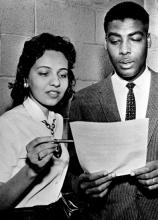
Diane Nash grew up in Chicago, living a life that did not necessarily foreshadow her future work as a freedom fighter. As a young student at Fisk University in Nashville, Ms. Nash experienced the humiliation of southern Jim Crow segregation and sought a way to challenge it. That search led her to Rev. James Lawson, who taught her and other luminaries of the movement how to fight for change nonviolently. Ms. Nash became a leader in the struggle to end segregation in Nashville, a struggle the young students in Nashville eventually won. Diane Nash then went on to help found the Student Nonviolent Coordinating Committee (SNCC), to lead the Freedom Rides, and then to play central roles in the Mississippi and Alabama freedom movements.
As we study American history and examine the project of American democracy, we must look for leaders under the radar of traditional tellings that are dominated by presidents and generals, stories of mainly white males. If democracy is about people actively working together to shape a collective future, it is essential that we study the life of Diane Nash, a gentle, but firm leader who became a freedom fighter and who contributed to that still unfinished work of moving the democratic project forward.
Dr. Robert H. Mayer is a professor of education and the director of the Center for the Advancement of Teaching at Moravian College. Dr. Mayer teaches courses on multicultural and philosophical foundations of education as well as courses on reflective approaches to teaching for all secondary teachers and for social studies teachers. Beyond teaching, Dr. Mayer has published two books for young people, The Civil Rights Act of 1964 (Greenhaven Press), a book he edited, and When the Children Marched: The Birmingham Civil Rights Movement (Enslow Publishers). Both won the Carter G. Woodson Award from the National Council for the Social Studies. He has also written for Cobblestone, a magazine of history. His primary research interest is in the area of teaching history. Dr. Mayer has published articles about teaching history in The Social Studies, Social Education, and the Magazine of History and more general articles on teaching in Teaching Education and Teacher Education Quarterly.


